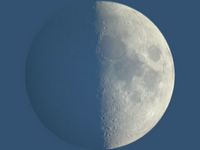FOUR
For the first time, at the end of the third day, I emerge from the spaceship, and walk on the cooling sand. A memory meets me; it is a moth I saw once in the change rooms of a swimming pool. Its wings are doused with urine, and its long antenna is caught on a shiny pink marble. Its legs scramble as I release more warm yellow fluid against the cool white urinal. I watch it flow down and gently touch it. Then this thought worms its way through my head:
This is life. It is kind. It is cruel, and it can end like this.
I put this behind me as the cushions of my feet flatten on the soft curls of sand. Each step is painful but the pain is also a good friend telling me that I am still alive. I swallow the last crumb of what I have and try to draw all the energy of the bread and water into me. But then there is a white-hot feeling in my back, and I fall into the bosom of the dune. I try to breathe evenly, and once this is achieved, I am stolen away into sleep once more. The dream that comes now is different.
“Do not be afraid, Andrew.”
I am unable to say anything, and why should I, I am sleeping.
“Now that you have come, you will see many new things, starting with yourself.”
It is like a voice springing, ethereal, from a typhoon, or a mountain. It is soft, like a breeze in a desert, but powerful, like a storm.
“You will go to the island. There you will meet the others.”
I am in no doubt that this is a dream. I am not going anywhere. Certainly not to any island.
“Yes you are. Rraditshipi will show you the way, but you have to walk it.”
This dialogue is unexpected. But, of course, I am partly responsible for it. I am creating it.
This is my dream after all. I am dreaming a dream for myself.
“But to walk here you have to keep your eyes open. Can you do that now?”
Suddenly I am very afraid. The disembodied voice doesn’t seem disembodied at all. I am fully awake, though my eyes are closed, but I sense, behind my eyelids, that someone wraithlike, but real is before me.
When I open my eyes shock shoots through me like electricity. There is no one here. This is almost more of a shock than if someone was here.
Then I feel something on my shoulder. I am turning in my sleep. I am turning in my wakefulness. I see a hand, and my eyes travel up the arm to a face, and lips. She says once more, “Andrew, you are not alone. Do not be afraid.” Something opens inside me, both joy and sorrow at once and I have nothing to build defences with. I weep. It is a wonderful feeling of relief like rain on a fallow field.
“The essence of all things, Andrew, is emptiness.” Her words seem to cover everything, and she seems to take the world in her care and I am merely part of that. She is the cool rain on my hot, charging heart.
I understand and I don’t understand. I don’t think about it, which is something new for me.
“I must leave you now, but I will send a messenger and he will bring you back to me when you are ready.”
“Is this real?” I croak these words to her between my tears. I am pathetic, but I don’t care.
“Most of your life is an illusion. But you have turned from that and you will change what you see when you stop seeking things before you find them, when you stop expecting life to be different from what it is. Life is, but life is also what you make it.”
“Who are you?”
“I am the desert dragon,” she says this with a smile. Gently she says, “Do not follow me now. Find your own path and it will bring you to me.”
Her hand leaves my shoulder and energy departs from me. I feel exhaustion, already, setting in, closing in, and shutting me down. I try to resist it; I try to hold on to the dreamy miasma in my mind.
And then she leaves. She seems to float over the sand and I watch her until long after she has disappeared. Then it becomes very cold above the great sparkling city.


